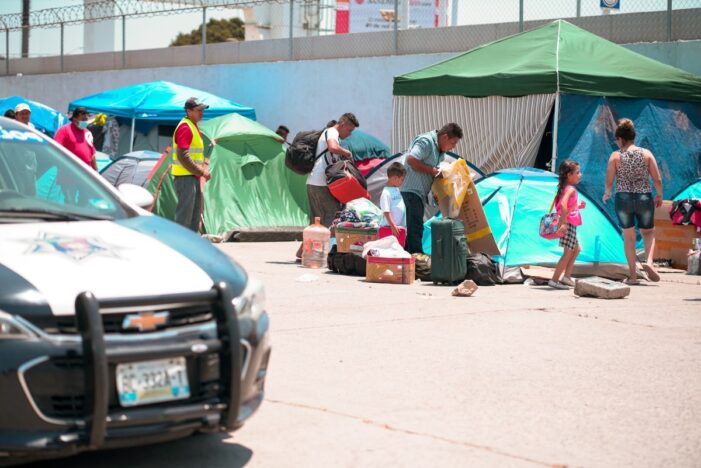By PAHO
Geneva, 20 July 2022 – Around the world, millions of refugees and migrants in vulnerable situations, such as low-skilled migrant workers, face poorer health outcomes than their host communities, especially where living and working conditions are sub-standard, according to the first WHO World report on the health of refugees and migrants. This has dire consequences for the probability that the world will not achieve the health-related Sustainable Development Goals for these populations.
“Today there are some one billion migrants globally, about one in eight people. The experience of migration is a key determinant of health and wellbeing, and refugees and migrants remain among the most vulnerable and neglected members of many societies,” said Dr Tedros Adhanom Ghebreyesus, WHO Director-General. “This report is the first to offer a global review of refugee and migrant health; it calls for urgent and collective action to ensure they can access health care services that are sensitive to their needs. It also illustrates the pressing need to address the root causes of ill health and to radically reorient health systems to respond to a world increasingly in motion.”
According to the International Organization for Migration (IOM), Northern America was the destination for 59 million international migrants in 2020. In Latin America and the Caribbean, the number of international migrants more than doubled since 2005 to 15 million in 2021, making it the region with the highest growth.
Based on an extensive review of literature from around the world, the report demonstrates that refugees and migrants are not inherently less healthy than host populations. It is, rather, the impact of the various suboptimal health determinants, such as education, income, housing, access to services, compounded by linguistic, cultural, legal and other barriers and the interaction of these during the life course, that are behind poor health outcomes.
The report reiterates that the experience of migration and displacement is a key factor in a person’s health and wellbeing, especially when combined with other determinants. For example, a recent meta-analysis of more than 17 million participants from 16 countries across five WHO regions found that, compared with non-migrant workers, migrant workers were less likely to use health services and more likely to have an occupational injury.
Evidence also showed that a significant number of the 169 million migrant workers globally are engaged in dirty, dangerous, and demanding jobs and are at greater risk of occupational accidents, injuries, and work-related health problems than their non-migrant counterparts, conditions exacerbated by their often limited or restricted access to and use of health services. The Report demonstrated critical gaps in data and health information systems regarding the health of refugees and migrants – while data and evidence are plentiful, they are fragmented and not comparable across countries and over time. Although these mobile populations are sometimes identifiable in global datasets used for SDG monitoring, health data are often missing from migration statistics and migratory status variables are often missing from health statistics. This makes it difficult to determine and track progress for refugees and migrants towards the health-related SDGs.
“It is imperative that we do more on refugees and migrants’ health but if we want to change the status quo, we need urgent investments to improve the quality, relevance and completeness of health data on refugees and migrants. We need sound data collection and monitoring systems that truly represent the diversity of the world population and the experience that refugees and migrants face the world over and that can guide more effective policies and interventions,” said Dr Zsuzsanna Jakab, WHO’s Deputy Director-General.
The Pan American Health Organization (PAHO is implementing a project in coordination with national authorities in ten Central- and South American countries to protect the health of migrants and ensure their access to health services. Information gaps, however, are a challenge that still needs to be addressed in order to strengthen and develop national policies and regulatory frameworks to include this population.
Earlier this year, and in alignment with global efforts, PAHO launched an information platform to address the lack of regional data on migration and health. The platform includes interactive dashboards on policy, legal, and regulatory frameworks, as well as scientific literature on health and migration, and is aimed at all stakeholders involved in developing health and migration policies, laws, and programs.
While lack of comparable data on the health of refugees and migrants across countries and over time often impedes good policy development towards health equity, policies and frameworks do exist that address and respond to the health needs of refugees and migrants. However, disparities in health outcomes remain and the report shows that they are mainly due to a lack of meaningful and effective implementation of policies.
“Health does not begin or end at a country’s border. Migratory status should therefore not be a discriminatory factor but a policy driver on which to build and strengthen healthcare and social and financial protection. We must reorient existing health systems into integrated and inclusive health services for refugees and migrants, in line with the principles of primary health care and universal health coverage,” said Dr Santino Severoni, Director of WHO’s Health and Migration Program.
Refugees and migrants can introduce innovative ideas that drive economic and social transformation. The Report highlights the extraordinary contributions of refugee and migrant healthcare workers to the COVID-19 frontline response. One of the most notable was the contributions of migrants in several countries of the Organization for Economic Co-operation and Development (OECD), which were particularly significant when in some countries as many as half of doctors or nurses are foreign born.
Implementing inclusive health systems that conform to the principle of right to health for all and universal health coverage would permit individuals in need of health services to be identified and supported early, before many problems become acute. Health systems are only as strong as their weakest link. The inclusion of refugees and migrants is a worthwhile investment for the development and wellbeing of societies around the world.




